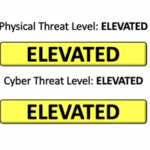
Faith-Based Daily Awareness Post 13 November 2025
Faith-Based Security Headlines
These updates are shared to help raise the situational awareness of Faith-Based organizations to best defend against and mitigate the impacts from all-hazards threats including physical security, cybersecurity, and natural disasters.
FB-ISAO Newsletter, v7, Issue 10
The November 2025 Faith-Based ISAO newsletter reports that both physical and cyber threat levels remain Elevated for U.S. faith communities, meaning risk is higher than usual though no specific threat is known. It highlights two major concerns: active shooter incidents and fire as a weapon. Citing recent attacks and RAND research, the newsletter urges layered security measures, behavioral-threat reporting, active-shooter drills, controlled access, reliable detection tools, and coordination with law enforcement. It also stresses that arson is increasingly used in complex attacks and recommends stronger fire prevention planning, local fire department coordination, and regular evacuation drills. In 2024, 841 incidents occurred at houses of worship, including 79 involving arson. The issue closes by promoting upcoming 2026 FB-ISAO training sessions focused on intelligence and preparedness.
U.S. faith levels plummet to lowest on record
A recent Gallup poll reveals a dramatic decline in religiosity in the U.S. – only 49% of American adults say religion is an important part of their daily lives, down from 66% in 2015, a 17-point drop among the steepest globally. While the U.S. once stood out for high levels of religious engagement among wealthy nations, it now closely resembles the median of OECD countries (36%) in terms of self-reported importance of religion. The shift signals major societal transformation: fewer identify as Christian (62% vs 78% in 2007) and more unaffiliated (29%) raising questions about how religion will continue to shape politics, social ties and national identity.
Analyst Comments: The Gallup findings show a major cultural and generational shift. The decline in religious affiliation may signal weakened institutional trust and fragmented community structures which can reduce local resilience and participation in traditional faith-based outreach and volunteer networks. From an organizational perspective this trend suggests fewer people are regularly engaged in HOWs affected the situational awareness and protective posture of those facilities.
New Report Highlights Growing Safety Concerns – and Practical Solutions for Community Organizations
A new white paper titled “Protecting What Matters” reveals that nearly half of Americans (49%) are worried about the risk of armed intruders at public events and community-gathering venues. The report highlights the increasing safety concerns for community organizations and nonprofits, noting that the threat landscape has grown more complex with blending’s of active-shooter risks, fire/hazard risks, and other disruptive scenarios. To help address these threats, the report offers practical solutions: establishing clear incident-response plans, conducting regular security drills, enhancing coordination with local law enforcement and emergency services, improving physical access controls and communications systems, and investing in training to build a “prepared mindset”. The overall message emphasizes that while many community organizations operate with limited budgets and resources, adopting these layered, scalable security practices is essential to safeguarding people, property, and mission-critical operations in today’s heightened environment.
Analyst Comments: This report aligns closely with what faith-based organizations (FBOs) have been experiencing in recent years rising anxiety about safety amid limited resources. The finding that nearly half of Americans fear violence at community gatherings mirrors concerns expressed within houses of worship, which continue to face both physical and ideological threats. For FBOs, the report’s emphasis on preparedness and layered security is particularly relevant, as many congregations rely heavily on volunteers and often lack formal security infrastructure. This reinforces a growing need for scalable, community-based safety strategies that combine awareness training, clear emergency communication plans, and strong relationships with local first responders. Faith-Based ISAO’s ongoing guidance, encouraging drills, behavioral threat assessment, and fire safety integration—reflects precisely the type of multi-hazard approach highlighted in the report.
More Faith-Based Stories
- Catholic Bishops Rebuke U.S. ‘Mass Deportation’ of Immigrants
- Woman Asks Churches If They Will Feed Starving Baby—The Response is Shocking
- Christ Church says Philadelphia’s oldest surviving bell was vandalized
- 3 churches vandalized with anti-Christian statements in Far Rockaway
- VIDEO: Police searching for suspect in $8,000 church railing theft in Meriden
- St. Louis church pantry hit by thefts, jeopardizing Thanksgiving food giveaway
- Fire burns down century-old Muhlenberg County church
- CAIR-Texas Calls for Hate Crime Probe of Harassment Targeting Praying Muslim Teenagers, Commends Youth for Courage
- Diocese cites safety concerns after alleged sexual assault closes local church
- Heads of major American religious traditions issue landmark statement supporting trans, intersex and nonbinary people
- ADL: The State of Antisemitism in Professional Academic Associations, 2025
- Megachurch Pastor Brian Coffey accused of negligence in alleged sexual abuse of minor by youth leader
- Maryland man faces federal charges for crimes allegedly linked to 764
- ABC News Investigation: Mental health crisis led to NYE blast at Trump’s Las Vegas hotel, police say
- ThreatBeat: CBO Breach Considered “Ongoing”
- ThreatBeat: State/Local Cyber Grants Extension in Shutdown Deal
- CFPB proposes to streamline small-business data collection rule
- Major SoCal atmospheric river storm threatens flooding and mudslides but could snuff out fire risk
- Five Reasons Why the US Escaped a Hurricane Landfall So Far This Year
- Our global progress on climate change, in one chart
- U.S. Support for Hurricane Melissa Recovery
- France marks 10 years since Bataclan massacre and other Islamic State attacks that still scar Paris
- Indian government calls deadly car explosion a terror attack by ‘anti-national forces’
- Truck hits pedestrians in South Korea market, killing 2 people and injuring 18
- Teen Nazi planned to livestream gas attack, police allege
- FBI IC3: Criminals Impersonate US Health Insurance Providers and Chinese Law Enforcement to Target Chinese Speakers Residing in the United States
More Security-Focused Content

The FB-ISAO’s sponsor Gate 15 publishes a daily newsletter called the SUN. Curated from their open source intelligence collection process, the SUN informs leaders and analysts with the critical news of the day and provides a holistic look at the current global, all-hazards threat environment. Ahead of the daily news cycle, the SUN allows current situational awareness into the topics that will impact your organization.


